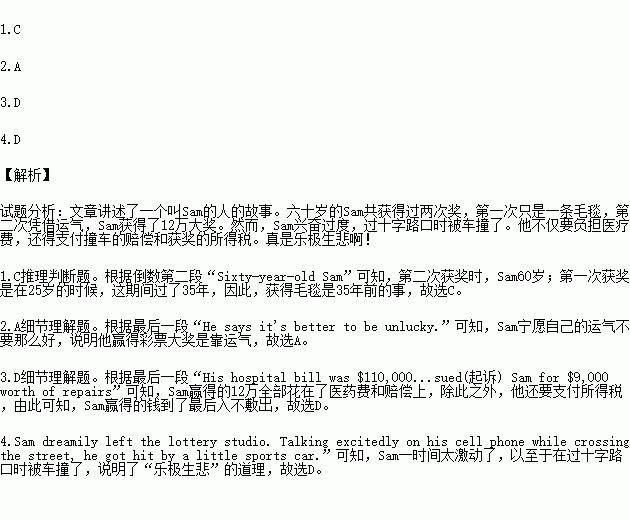题目内容
Sam, an unemployed man, said it was only the second thing he had ever won in his life. The first thing was a blanket at a church raffle(抽奖) when he was 25 years old. But this was much bigger: it was $120,000! He had won the Big Cube(骰子), a state lottery(彩票) game. To win, a contestant must first guess which number a spinning cube will stop on. The cube has six numbers on it: 1X, 10X, 50X, 100X, 500X, and 1000X. If he is correct, the contestant must then guess which of two selected variables(变量) is going to be greater. So, just guessing which number appears on the cube does not guarantee that you will win any money. Sam correctly guessed 1000X, but he still had to choose between two variables. One variable was the number of cars that would run the stop sign at Hill Street and Lake Avenue in six hours. The other variable was the number of times that a teenage boy would change TV channels in a three-hour period. This was a tough decision.
Finally, Sam flipped(翻转) a coin. It came up heads, so Sam picked the teenager. He picked right. The stop sign was run only 76 times, but the teen clicked 120 times. Sixty-year-old Sam jumped for joy, for he had just won 1000 times 120, or $120,000. Sam dreamily left the lottery studio. Talking excitedly on his cell phone while crossing the street, he got hit by a little sports car.
Sam is slowly getting better. He was in the hospital for a month. His hospital bill was $110,000. And the insurance company for the little sports car's owner sued(起诉) Sam for $9,000 worth of repairs. Also, Sam still has to pay taxes on his winnings. Sam doesn't play the state lottery any more. He says it's better to be unlucky.
1.Sam won the blanket ________ years ago.
A. 25 B. 60 C. 35 D. 76
2.Sam won the lottery because ______.
A. he was lucky B. he was good at math
C. he was smart D. he was tough
3.Which of the following is TRUE according to the passage?
A. The lottery game was a complete lie.
B. Sam was quite familiar with the boy.
C. The owner of the car is now in hospital.
D. Sam will have none of the prize money left.
4.Sam’s experience shows that ______
A. everything has its time and that time must be watched.
B. he who risks nothing, gains nothing.
C. everything comes to him who waits.
D. he who laughs on Friday will weep on Sunday.


